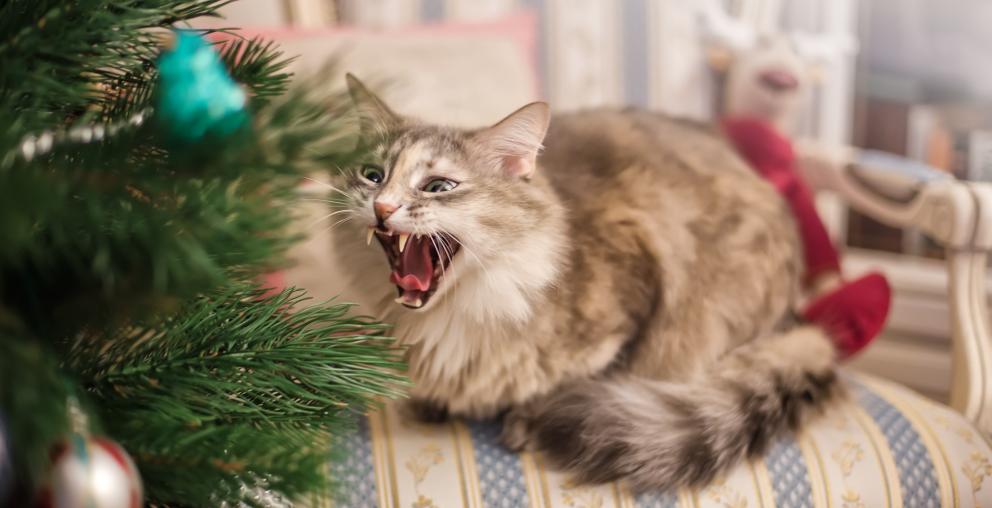Holiday Hazards for Pets [1]

Household Holiday Hazardous Items
Whenever the routine of your household is disrupted there is potential for unexpected things to happen. During the holidays, many households become hectic with visitors coming and going. If your home feels hectic to you, it will feel different for your pet as well. Pet behaviours may change including chewing something they have previously left alone! To make sure everyone in your home has a happy holiday, keep these items out of your animals’ reach when possible.
Candles – Make sure Hanukkah and other celebratory candles are stationed high enough to avoid burns to wagging cat and dog tails.
Christmas Trees – Cats are attracted to dangling tinsel and ribbons. If eaten, tinsel and ribbons can cause intestinal obstruction requiring surgery to remove. Chewing on electrical cords can lead to electrocution. If you see your pet quietly absorbed near the Christmas tree check it out as it may be chewing on an electrical cord, ornament, or something else that shouldn’t be chewed on! Also, ensure that your Christmas tree is securely anchored this holiday season. A falling tree can potentially cause injury to your pet, and spilled stagnant tree water can be a breeding ground for bacteria, which a dog or cat may ingest.
Dietary Indiscretion
Assure your dog doesn’t eat raisins, onions, yeast, or dough. Some other special holiday hazards or considerations:
Chocolate – The theobromine in chocolate is deadly to dogs and cats. Dogs are notorious for sniffing out gifts containing chocolate under the tree and for eating the wrappers and the chocolate.
Garbage and table scraps – Fatty scraps can lead to vomiting, diarrhea, and pancreatitis. When pets get into the garbage they may eat turkey bones and these are very problematic because of sharp edges that can puncture the esophagus, stomach or intestines. When pets really like one of your visitors it may be because that person is sneaking them food under the table even though you have asked them not to feed your pets “people food”. Supply each guest with a baggy of one or two appropriate pet treats if they really must feed your animals. A few extra dog treats over the holiday are better than getting uncontrolled table scraps.
New toys – There are no legislated safety standards for pet toys. Check new dog/cat toys for loose or dangling parts that could cause choking or intestinal obstruction if eaten. Remove any dangerous parts (i.e. dangling bells on cat toys) to avoid intestinal obstruction.
Plants - Holiday plants such as poinsettias can be irritating to the mouth or stomach. Mistletoe and holly can cause vomiting and lethargy, and mistletoe also has the potential to cause heart problems. For cats, any plant in the lily family can be deadly.
Antifreeze - With different vehicles around, check for leaking antifreeze. Antifreeze (ethylene glycol) has a sweet taste and so dogs and cats will drink it. It is very toxic requiring immediate treatment to prevent kidney failure. As little as 1 tsp for a cat and 1 tbsp for a dog can be fatal. Snow globes also contain antifreeze.
Cannabis - High THC cannabis products can be harmful to animals. Your pet can be inadvertently exposed to cannabis residue that has been dropped on the ground or left uncovered. Seizures and severe intoxication may occur at high doses, especially if cannabis is mixed with chocolate or another potentially toxic substance like those found in artificial sweeteners. Second-hand smoke inhalation toxicity from cannabis can be serious and affect a pet’s ability to breathe. Take your pet to a veterinary hospital immediately for professional care if you suspect they have been exposed to cannabis.
Call your veterinary clinic if you have any concerns about what your pet has gotten into.
Additional Resources
FDA Holiday Recommendations [2]
